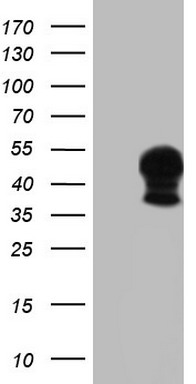Product Info Summary
| SKU: | A11003 |
|---|---|
| Size: | 100 µl |
| Reactive Species: | Human |
| Host: | Rabbit |
| Application: | IHC, WB |
Customers Who Bought This Also Bought
Product info
Product Name
Anti-SNX16 Rabbit Polyclonal Antibody
SKU/Catalog Number
A11003
Size
100 µl
Description
Boster Bio Rabbit polyclonal SNX16 Antibody. Catalog# A11003. Tested in IHC, WB. This antibody reacts with Human.
Storage & Handling
Store at -20°C as received.
Cite This Product
Anti-SNX16 Rabbit Polyclonal Antibody (Boster Biological Technology, Pleasanton CA, USA, Catalog # A11003)
Host
Rabbit
Contents
PBS (PH 7.3) containing 1% BSA, 50% glycerol and 0.02% sodium azide.
Clonality
Polyclonal
Isotype
IgG
Immunogen
Synthetic peptide conjugated to KLH derived from within residues 70-150 of Human SNX16.
*Blocking peptide can be purchased. Costs vary based on immunogen length. Contact us for pricing.
Reactive Species
A11003 is reactive to SNX16 in Human
Reconstitution
Calculated molecular weight
38.848kDa
Antibody Validation
Boster validates all antibodies on WB, IHC, ICC, Immunofluorescence, and ELISA with known positive control and negative samples to ensure specificity and high affinity, including thorough antibody incubations.
Application & Images
Applications
A11003 is guaranteed for IHC, WB Boster Guarantee
Validation Images & Assay Conditions

Click image to see more details
Immunohistochemical staining of paraffin-embedded Human Kidney tissue within the normal limits using Rabbit polyclonal anti-SNX16 antibody at (Heat-induced epitope retrieval by 1 mM EDTA in 10mM Tris

Click image to see more details
Immunohistochemical staining of paraffin-embedded Human liver tissue within the normal limits using Rabbit polyclonal anti-SNX16 antibody at (Heat-induced epitope retrieval by 1 mM EDTA in 10mM Tris

Click image to see more details
HEK293T cells were transfected with the pCMV6-ENTRY control (Left lane) or pCMV6-ENTRY SNX16 (Right lane) cDNA for 48 hrs and lysed. Equivalent amounts of cell lysates (5 ug per lane) were separated by SDS-PAGE and immunoblotted with Rabbit.
Protein Target Info & Infographic
Gene/Protein Information For SNX16 (Source: Uniprot.org, NCBI)
Gene Name
SNX16
Full Name
Sorting nexin-16
Weight
38.848kDa
Superfamily
sorting nexin family
Alternative Names
DKFZp666H147; sorting nexin 16; sorting nexin-16 Snx16|sorting nexin 16|sorting nexin-16
*If product is indicated to react with multiple species, protein info is based on the gene entry specified above in "Species".For more info on SNX16, check out the SNX16 Infographic

We have 30,000+ of these available, one for each gene! Check them out.
In this infographic, you will see the following information for SNX16: database IDs, superfamily, protein function, synonyms, molecular weight, chromosomal locations, tissues of expression, subcellular locations, post-translational modifications, and related diseases, research areas & pathways. If you want to see more information included, or would like to contribute to it and be acknowledged, please contact [email protected].
Specific Publications For Anti-SNX16 Rabbit Polyclonal Antibody (A11003)
Loading publications
Recommended Resources
Here are featured tools and databases that you might find useful.
- Boster's Pathways Library
- Protein Databases
- Bioscience Research Protocol Resources
- Data Processing & Analysis Software
- Photo Editing Software
- Scientific Literature Resources
- Research Paper Management Tools
- Molecular Biology Software
- Primer Design Tools
- Bioinformatics Tools
- Phylogenetic Tree Analysis
Customer Reviews
Have you used Anti-SNX16 Rabbit Polyclonal Antibody?
Submit a review and receive an Amazon gift card.
- $30 for a review with an image
0 Reviews For Anti-SNX16 Rabbit Polyclonal Antibody
Customer Q&As
Have a question?
Find answers in Q&As, reviews.
Can't find your answer?
Submit your question
1 Customer Q&As for Anti-SNX16 Rabbit Polyclonal Antibody
Question
Do you require any kind of licensing agreement with the researcher who wants to evaluate a Boster polyclonal antibody for possible inclusion in a commercialize product?
Verified customer
Asked: 2022-07-05
Answer
Yes, we need to have a licensing agreement, for many purposes but primarily to ensure the continuous supply of this product, which the researcher would need. We should ask them to discuss more details including the expected demand of this antibody. Since this is a polyclonal antibody we need to produce ahead of time and validate to ensure it keeps working properly for the customer.
Boster Scientific Support
Answered: 2022-07-05




